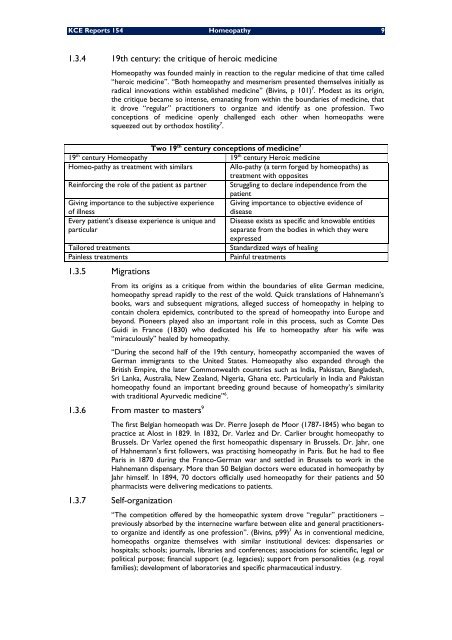Etat des lieux de l'homéopathie en Belgique - KCE
Etat des lieux de l'homéopathie en Belgique - KCE
Etat des lieux de l'homéopathie en Belgique - KCE
You also want an ePaper? Increase the reach of your titles
YUMPU automatically turns print PDFs into web optimized ePapers that Google loves.
<strong>KCE</strong> Reports 154 Homeopathy 9<br />
1.3.4 19th c<strong>en</strong>tury: the critique of heroic medicine<br />
Homeopathy was foun<strong>de</strong>d mainly in reaction to the regular medicine of that time called<br />
“heroic medicine”. “Both homeopathy and mesmerism pres<strong>en</strong>ted themselves initially as<br />
radical innovations within established medicine” (Bivins, p 101) 7 . Mo<strong><strong>de</strong>s</strong>t as its origin,<br />
the critique became so int<strong>en</strong>se, emanating from within the boundaries of medicine, that<br />
it drove “regular” practitioners to organize and i<strong>de</strong>ntify as one profession. Two<br />
conceptions of medicine op<strong>en</strong>ly chall<strong>en</strong>ged each other wh<strong>en</strong> homeopaths were<br />
squeezed out by orthodox hostility 7 .<br />
Two 19 th c<strong>en</strong>tury conceptions of medicine 7<br />
19 th c<strong>en</strong>tury Homeopathy 19 th c<strong>en</strong>tury Heroic medicine<br />
Homeo-pathy as treatm<strong>en</strong>t with similars Allo-pathy (a term forged by homeopaths) as<br />
treatm<strong>en</strong>t with opposites<br />
Reinforcing the role of the pati<strong>en</strong>t as partner Struggling to <strong>de</strong>clare in<strong>de</strong>p<strong>en</strong><strong>de</strong>nce from the<br />
pati<strong>en</strong>t<br />
Giving importance to the subjective experi<strong>en</strong>ce Giving importance to objective evi<strong>de</strong>nce of<br />
of illness<br />
Every pati<strong>en</strong>t’s disease experi<strong>en</strong>ce is unique and<br />
particular<br />
disease<br />
Disease exists as specific and knowable <strong>en</strong>tities<br />
separate from the bodies in which they were<br />
expressed<br />
Tailored treatm<strong>en</strong>ts Standardized ways of healing<br />
Painless treatm<strong>en</strong>ts Painful treatm<strong>en</strong>ts<br />
1.3.5 Migrations<br />
From its origins as a critique from within the boundaries of elite German medicine,<br />
homeopathy spread rapidly to the rest of the wold. Quick translations of Hahnemann’s<br />
books, wars and subsequ<strong>en</strong>t migrations, alleged success of homeopathy in helping to<br />
contain cholera epi<strong>de</strong>mics, contributed to the spread of homeopathy into Europe and<br />
beyond. Pioneers played also an important role in this process, such as Comte Des<br />
Guidi in France (1830) who <strong>de</strong>dicated his life to homeopathy after his wife was<br />
“miraculously” healed by homeopathy.<br />
“During the second half of the 19th c<strong>en</strong>tury, homeopathy accompanied the waves of<br />
German immigrants to the United States. Homeopathy also expan<strong>de</strong>d through the<br />
British Empire, the later Commonwealth countries such as India, Pakistan, Bangla<strong><strong>de</strong>s</strong>h,<br />
Sri Lanka, Australia, New Zealand, Nigeria, Ghana etc. Particularly in India and Pakistan<br />
homeopathy found an important breeding ground because of homeopathy’s similarity<br />
with traditional Ayurvedic medicine” 6 .<br />
1.3.6 From master to masters 9<br />
The first Belgian homeopath was Dr. Pierre Joseph <strong>de</strong> Moor (1787-1845) who began to<br />
practice at Alost in 1829. In 1832, Dr. Varlez and Dr. Carlier brought homeopathy to<br />
Brussels. Dr Varlez op<strong>en</strong>ed the first homeopathic disp<strong>en</strong>sary in Brussels. Dr. Jahr, one<br />
of Hahnemann’s first followers, was practising homeopathy in Paris. But he had to flee<br />
Paris in 1870 during the Franco-German war and settled in Brussels to work in the<br />
Hahnemann disp<strong>en</strong>sary. More than 50 Belgian doctors were educated in homeopathy by<br />
Jahr himself. In 1894, 70 doctors officially used homeopathy for their pati<strong>en</strong>ts and 50<br />
pharmacists were <strong>de</strong>livering medications to pati<strong>en</strong>ts.<br />
1.3.7 Self-organization<br />
“The competition offered by the homeopathic system drove “regular” practitioners –<br />
previously absorbed by the internecine warfare betwe<strong>en</strong> elite and g<strong>en</strong>eral practitioners-<br />
to organize and i<strong>de</strong>ntify as one profession”. (Bivins, p99) 7 As in conv<strong>en</strong>tional medicine,<br />
homeopaths organize themselves with similar institutional <strong>de</strong>vices: disp<strong>en</strong>saries or<br />
hospitals; schools; journals, libraries and confer<strong>en</strong>ces; associations for sci<strong>en</strong>tific, legal or<br />
political purpose; financial support (e.g. legacies); support from personalities (e.g. royal<br />
families); <strong>de</strong>velopm<strong>en</strong>t of laboratories and specific pharmaceutical industry.

















